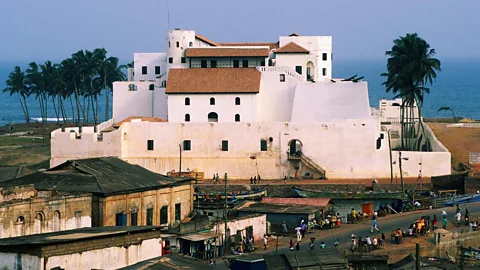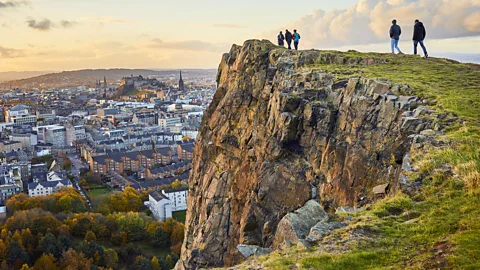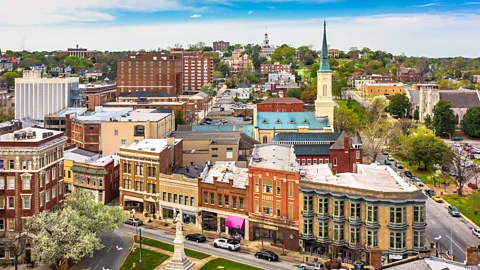Five countries helping you reconnect you with your roots
 Getty Images
Getty ImagesAs DNA ancestry testing kits like Ancestry and 23&Me have become more accessible and affordable, "heritage tourism", or travel based on reconnecting people with their places of origin, has become more popular than ever.
With tests offering percentage-based estimates of where your DNA might hail from, those who don't have direct knowledge of their genealogy can explore the places where their families may have originated.
What's more, the rise of roots travel is being looked at as a sustainable alternative to overtourism. The European Union in particular, which sees the highest rates of tourism (and subsequently overtourism) in the world, has been calling for its member states to promote roots tourism, which often can lead visitors to seek out smaller villages and under-touristed regions, which in turn boost local economic development.
Travel agencies specialising in heritage trips and tours have been growing in popularity, too. In 2021, Kensington Tours partnered with Ancestry.com to create a series of heritage journeys to places like Italy, Germany, Japan and Ghana in partnership with a professional genealogist to help provide a more comprehensive analysis of the sites that might hold the most history and meaning for a family origin journey. "These trips really started to gain in popularity in 2022 once the pandemic ended and travel restrictions were lifted globally," said Debra Loew from Kensington Tours. "This is also when we saw a dramatic increase overall in multi-gen travel as families really looked to reconnect through travel after many months – and in some cases years – without travelling."
While many European countries have been promoting roots travel for decades, others are offering new and specific ways to connect visitors with their heritage. Here are a few of the places that are best helping travellers return to their roots.
 Getty Images
Getty ImagesItaly
Nearly 80 million people around the world can trace their ancestry back to Italy, and the Italian Ministry of Tourism is encouraging those in the diaspora to return, deeming 2024 the "Year of Italian Roots in the World". They've even launched the website Italea to make it easier for visitors to find more information about the country's 20 regions, with tips on how to uncover family origin stories.
Tour operators have seen impressive results from the initiatives. "Heritage travel has been the foundation of my business, making up more than 95% of our focus," said Marino Cardelli, who founded travel agency Experience BellaVita in 2018. "This work has become more than a business – it's a profoundly rewarding calling that allows me to help clients from around the world reconnect with their Italian roots. The majority of my clients seek out specific towns in Italy to uncover family histories, and we offer dedicated genealogy services to assist them."
He notes that tracing family history here can be complex. Many Italians emigrated in the early 1900s, and their original homes may have been destroyed during the World Wars. Still, Italy has extensive civil and parish records dating as far back as the 1400s that can supply promising information – and sometimes even lead to locating living relatives.
 Getty Images
Getty ImagesGhana
This West African country, once the epicentre of the transatlantic slave trade, has long been welcoming members of the African diaspora to return to their roots, including The Year of the Return in 2019 and The Joseph Project in 2007. The rise of DNA testing has been a particular growth driver of African descendants looking to understand more of the specific regions or ethnic groups that their families might have hailed from.
Because of its history as a key port during the slave trade, Ghana often marks an important stop in roots travel to Africa. Between the 16th and 18th Centuries, tens of thousands of enslaved people per year passed through places like Elmina Castle, the last continental holding cells before they were sent on ships to North and South America.
Today heritage tours like Kensington's "Door Of No Return Ancestral Journey" offer visits to those historic sites, alongside meetings with experts to explore stories from visitors' specific ethnic groups and heritage, and learn about their migration, customs and cultures.
 Getty Images
Getty ImagesScotland
More than 40 million people living around the world can claim Scottish ancestry of some kind, according to Visit Scotland, and as a result, millions of travellers return each year to reconnect with their roots. In particular, 70% of "long-haul" visitors (those hailing from further afield like Canada, the US, Australia and Asia) state that history and culture is the reason for their visit – and many who do come report a feeling like "coming home" or belonging from the second they step on Scottish soil. Scotland has also seen a rise in ancestry and history-based travel based on popular shows set in the country like Outlander.
For travellers who know the names of some of their ancestors, the government-run site Scotland's People offers records searchable by name and year. Others, who might just be starting with a distinctive Scottish surname, can try researching their clan name; one small Leith-based business, Scots Clan, offers a comprehensive A-Z listing of every clan, with mottos, tartans and associated people and places.
Covering more than 30 sites and 5,000 years of history, The Explorer Pass offered by Historic Environment Scotland is one way to discover places that might be of family note, like Campbell Castle or the even more ancient ancestors of the Jarlshof Prehistoric and Norse Settlement.
 Getty Images
Getty ImagesIndia
With the world's biggest diaspora, with around 18 million people born in the country recorded as living overseas, India has good reason to both attract those citizens and others with Indian ancestry back for a visit. Most recently, the government launched the Pravasi Bharatiya Express, a brand new tourist train specifically for those of Indian origin. The catch? You must be between the ages of 45 and 65 to qualify for the ride, scheduled to depart on 9 January 2025, a date chosen to commemorate the return of Mahatma Gandhi from South Africa to India in 1915.
More like this:
• What it's like to live in the world's most liveable cities for 2024
Though the train only has a capacity of 156 passengers, the three-week journey will cover important touristic and religious sites across the country, including Ayodhya, Patna, Gaya, Varanasi, Mahabalipuram, Rameshwaram, Madurai, Kochi, Goa, Ekta Nagar (Kevadia), Ajmer, Pushkar and Agra. Nominations can be sent to the government, who will cover the majority of the cost for those selected.
It's likely these types of investments will continue as India focuses its tourist efforts on promoting heritage. The country has already seen a post-pandemic boost, with a 46% growth in both inbound and outbound tourism, according to Trevolution Group. Behind that trend, the report saw a big jump in Indian Americans travelling back to the country to see friends and relatives, suggesting that roots travel will continue to be a tourism growth driver for the country.
 Getty Images
Getty ImagesUnited States
Though the US and Canada both saw plenty of European immigration during their days as British colonies, the cost of that immigration to the Indigenous people has all too frequently been swept aside. Often forced far off their local lands, Indigenous people had no choice but to live elsewhere. Today, some tourism bureaus have made meaningful efforts toward welcoming the descendants back, working in partnership with local Indigenous leaders to preserve and share the important history with displaced descendants and other visitors to the region.
One example is the area that is now Macon, Georgia, which was once 60 villages that formed the Muscogee (Creek) Nation. However, the Indian Removal Act of 1830 forcibly relocated the Muscogee Nation to Oklahoma. The importance of the original historical site has never been lost, however, and the tourism bureau Visit Macon has been working in partnership with the Muscogee Nation to preserve historical sites like Ocmulgee Mounds National Historical Park, home to 17,000 years of Indigenous history. The stakeholders have both been pushing to have the area designated as a national park, and if granted, will become one of the first parks in the country to be co-managed by an Indigenous tribe.
Citizens from the Muscogee Nation have been returning to their land not just as visitors, but active participants in building initiatives and celebrations for the town of Macon. The National Park Service regularly hires Muscogee (Creek) citizens, and priority is given to Nation members for available positions. In September 2024, the first street signs that share both the English and Creek names were unveiled, with 100 more to be installed in the downtown district in the coming months.
--
If you liked this story, sign up for The Essential List newsletter – a handpicked selection of features, videos and can't-miss news, delivered to your inbox twice a week.
